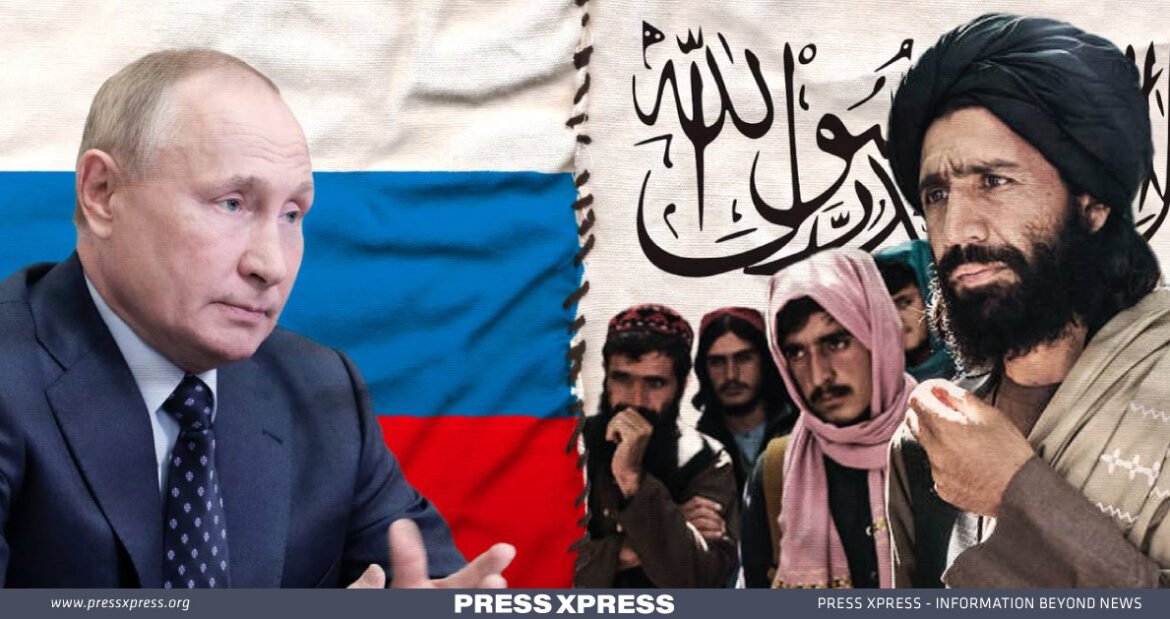Russia appears to be reconsidering its stance towards the Taliban, a group once designated as a banned terrorist organization. Talks are currently underway to potentially remove the Taliban from Russia’s list of banned groups, reflecting a shift in the global perception of the group that now holds power in Afghanistan.
You Can Also Read: Opposition Stuns Erdogan in Turkish Local Elections
This potential move by Russia carries significant implications. Delisting the Taliban would represent a complex decision, influenced by various factors, including geopolitical dynamics, security concerns, and the evolving situation in Afghanistan. The world is closely watching Russia’s next steps, as its decision could alter the international landscape regarding the Taliban’s status.
The Taliban’s Emergence and Russia’s Evolving Stance
The 1990s saw the rise of the Taliban in post-Soviet Afghanistan, promising order and an end to rampant crime. Swiftly capturing Kabul in 1996, they imposed strict Islamic rule blending Deobandi, Wahhabi, and Pashtun codes across most of the country.
However, their regime was brutally oppressive. Women faced severe restrictions, education was denied, cultural artifacts destroyed, and harsh punishments imposed. While some saw the order in their rule, the world largely opposed their ways.
Initially firm in banning the Taliban as terrorists in 2003, Russia’s stance gradually shifted. By 2018, they engaged in talks, recognizing shared goals against ISIS and viewing the Taliban as a potential tool.
The U.S. withdrawal in 2021 left a vacuum, which Russia saw as an opportunity to exert influence in the strategically important Central Asian region, with Afghanistan at its core. Security concerns drove Russia’s aim to play a pivotal role, with the Taliban as part of the equation.
Moscow’s approach was nuanced, maintaining contact with Taliban leaders and strategically discussing the future with an eye toward regional stability.
When the Taliban swiftly regained power in 2021, Russia’s response was calm, hinting at potential ties and portraying them as a reformed force for peace, distinct from their brutal past.
This background chronicles the Taliban’s journey from rise to ban, terror to talks, and Russia’s evolving role, setting the stage for the unfolding narrative’s next chapters.
Shift in Policy
The Taliban’s swift return to power in 2021 was met with a measured reaction from Russia, which saw an opportunity for stability and security in the strategically vital region. Diplomacy took center stage as Moscow engaged Taliban leaders in open dialogue, discussing prospects for peace and cooperation.
The U.S. withdrawal left a vacuum that Russia swiftly moved to fill, offering support and seeking influence over the Taliban as Afghanistan’s new power brokers. This evolving policy marks a stark departure from past adversarial views, signaling a pragmatic realization that the Taliban could potentially become allies.
While not a sudden move, this calculated shift stems from Russia’s long-term vision for the region’s future. By reviewing the Taliban’s status, Moscow aims to strategically position itself as a key player in shaping Afghanistan’s trajectory.
The implications of Russia’s decision are far-reaching, affecting global politics, altering regional dynamics, and challenging perceptions. Symbolic of Russia’s intent, the potential removal from the terrorist list signals a turning point – a pivot that the world watches with keen interest as this pivotal story continues to unfold.
Driving Forces Behind Russia’s Taliban Pivot
Russia’s shift in stance towards the Taliban, potentially removing them from its terrorist list, is driven by a complex interplay of geopolitical, security, and strategic interests.
Geopolitical Ambitions: Central Asia, with Afghanistan at its core, is a region of immense importance for Russia. By engaging with the Taliban, Moscow aims to exert influence, establish control, and position itself as a leading power in an area vital to its security interests.
Security Imperatives: With the Taliban controlling Afghanistan’s borders, Russia sees an opportunity to address instability concerns. Cooperation against shared enemies like ISIS could help secure Russia’s borders and promote regional security.
Diplomatic Overtures: Russia has taken a diplomatic approach, meeting with Taliban leaders to foster cooperation and progress toward peace – a move that aligns with its strategic interests in the region.
Filling the Void: The U.S. withdrawal from Afghanistan left a power vacuum that Russia is eager to fill. By offering support and seeking influence over the Taliban, now the dominant force in Afghanistan, Russia aims to solidify its regional presence.
Long-term Strategy: Russia’s policy shift reflects a long-term, calculated vision for the region’s future, where it sees itself playing a pivotal role in shaping the trajectory of events.
Stability Imperative: Ultimately, Russia’s overarching goal is to establish a stable region under its influence. Engaging with the Taliban is seen as a means to ensure peace and security in an area of vital strategic importance.
Russia’s evolving policy towards the Taliban is a multifaceted decision driven by complex geopolitical, security, and strategic considerations. As the region’s future hangs in the balance, Russia’s move will have far-reaching global implications, underscoring the high stakes at play.
Conclusion:
Diplomacy takes center stage as Russia engages the Taliban, both parties seeking mutually beneficial outcomes through open dialogue and cooperation.
However, Russia’s strategy extends far beyond immediate concerns. With an eye toward the future, Moscow aims to cement its influence and be a dominant player in shaping the region’s trajectory – a long-term game of power and priorities. Central Asia finds itself at the epicenter of these tectonic shifts, with Russia’s role rapidly expanding and the Taliban emerging as a pivotal force to be reckoned with.
As the world awaits the outcome of Russia’s deliberations, one thing is clear: this decision carries profound implications that will reverberate across the global geopolitical landscape for years to come, rewriting longstanding narratives and forging new alliances in a perpetually evolving great game.


